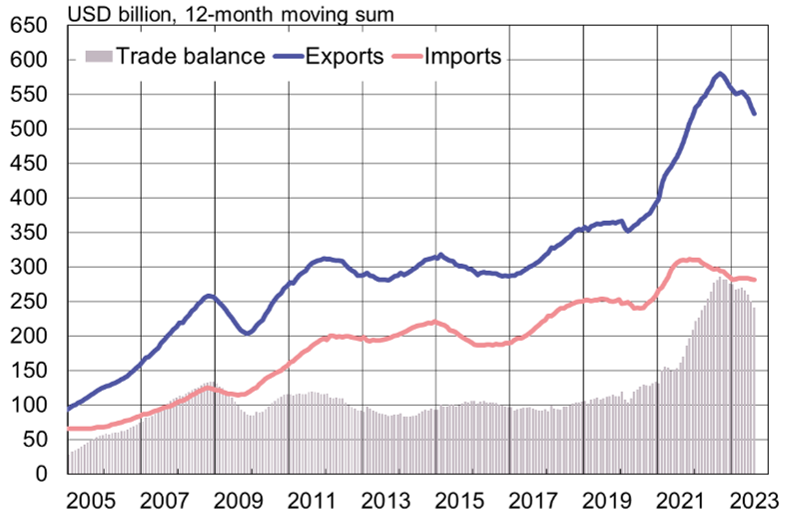BOFIT Weekly Review 40/2023
European firms report increased uncertainty surrounding China’s business environment
The European Union Chamber of Commerce in China (European Chamber) in late September released a position paper calling for improved political and commercial dialogue between China and Europe. The European Chamber’s 2023/2024 position paper provides an assessment of the Chinese business environment from the perspective of European firms operating in China and offers more than a thousand recommendations on ways the Chinese government can improve business conditions.
The report notes that European firms felt that predictability and reliability, which are essential to attracting foreign investment, eroded during the Covid-19 pandemic due to erratic political decisions. The lifting of covid restrictions in late 2022 was a positive surprise, but corporate confidence in the long-term growth possibilities offered by China has been damaged. With China increasingly focused on economic self-reliance, European firms felt that only those industries directly supportive of China’s policy goals could prosper as they did back in the days of consistent high growth in China.
The pandemic years revealed the weak links in international supply chains. Geopolitical uncertainty and Russia’s war on Ukraine have further increased the risk awareness of European firms, and this is reflected in business as actions to make their production chains more durable. Some European firms are considering or have already shifted their investments out of China to increase supply chain resilience, or have on-shored supply chains into China, detaching them from global value chains.
The European Chamber reports that the mixed messaging from the Chinese government has further increased uncertainty. For example, earlier this year China announced that it would concentrate on attracting foreign investment and liberalising the economy, but thereafter has taken little action to promote these goals. At the same time, China’s push for technological self-reliance continues to restrict the access of foreign firms to the Chinese market. The new national security legislation has also made foreign firms more cautious.
To improve the business environment, the European Chamber recommends that China’s political decision-makers focus on tackling structural impediments to economic growth and the challenges facing the private sector. The report’s concrete recommendations pertained, among other things, to supporting consumer demand and increasing productivity through market liberalisation. The European Chamber would like to see improved political decision-making by allowing greater space for discussion and constructive feedback, reduction of corporate risks by separating political issues from the business world, as well as maintained focus on the green transition during economic recovery. Such measures would strengthen confidence in China’s business environment and the willingness of international firms to operate in China – and possibly even increase investment in China.
The EU is China’s most important trading partner, accounting for about 15 % of Chinese goods exports and 11 % of Chinese imports. In January-August, Chinese goods exports to the EU contracted by 10 % y-o-y in dollar terms, or more than exports overall (down by 5 %). The value of China’s goods imports from the EU shrank by 2 % y-o-y (total value of imports down by 8 %). Nearly half of China’s exports to the EU fell under the machinery & equipment category. The value of exports in this category fell by 8 % y-o-y in the January-August period. In contrast, the value of exports in the transport vehicle category rose by 17 % and accounted for 8 % of total exports. China’s most important EU import categories were machinery & equipment (30 % of the value of EU imports), chemicals (19 %) and transport vehicles (16 %).
The value of Chinese goods exports to the EU27 countries surged during the Covid-19 pandemic, but has declined somewhat recently.

Sources: China Customs, Macrobond and BOFIT.